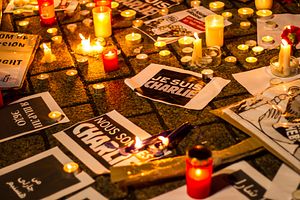BBC Monitoring reports that while the Charlie Hebdo shootings have resulted in stunning displays of fraternité, the Chinese media remains unmoved, even cynical.
The shootings at Charlie Hebdo, Montrouge, and the kosher market in Porte de Vincennes have left 20 dead, making this the bloodiest terrorist attack in France since the 1961 Vitry-Le-François train bombing, in which 28 died. The republican marches held in honor of the victims drew almost 4 million people, a crowd not seen in France since liberation from the Nazis in 1944.
But as the BBC report indicates, the Chinese media has taken the opportunity to blame the cartoonists and call for restrictions on freedom of speech. Xinhua News, which is operated by the Chinese government, commented that despite criticisms for its vulgarity and malicious attacks, Charlie Hebdo “persisted in its way of doing things.”
The article claims that because “the world is plural, freedom of the press should be limited” and “for the sake of peaceful coexistence, there must be mutual respect.” It describes Charlie Hebdo as “unbridled, unprincipled satire” and argues that while “cartoons bring about laughter in people, firstly they should not hurt others.”
But the very nature of satire lies in exposing immorality in order to shame people into doing better. Laughter gets people to listen while also helping the satirist approach sensitive subjects, but laughs are not essential to the art of satire. And since shame is a kind of pain, perhaps it should in fact hurt others. If it did not, it might no longer be constructive, for who would even flinch when confronted by the toothless kitten of polite satire? And one pauses to imagine what the literary landscape would look like without works such as A Modest Proposal, Candide, The Adventures of Huckleberry Finn, A Clockwork Orange or Nineteen Eighty-Four.
But then, none of these works sought to lacerate simply for the sake of drawing blood. They are constructive not merely because they look to shame their target, but because they’ve chosen the right target. Had Thomas Swift taken aim at the Irish, or Mark Twain at the slaves, these works would’ve been uncontroversial. And worse, they would now be little more than evidence of our moral adolescence.
In other words, these great works were not guilty of the charge Xinhua News lays at the doorstep of Charlie Hebdo, namely that of being “malicious.” As Slate explains, Charlie Hebdo’s 2012 “Intouchables 2” satire was followed on the next page by pornographic images of Muhammad. What is the moral project here? Telling Muslims they should learn to take a joke by spitting on what they hold dear? Or is this just bullying?
The debate over satirical decency goes all the way back to the light-hearted satires of Horace and his venomous contemporary Juvenal. Horace mocked mainstream Roman society, in the way perhaps that George Carlin mocked mainstream Americans or Chris Rock parodies African Americans. But Juvenal was the type who might pick someone from the crowd and slander him mercilessly. Horace used levity to educate the public by attacking common flaws while Juvenal used anger to punish individuals.
It’s easy to dismiss Xinhua’s position as the propaganda of a state that famously restricts free speech, but in this case they’re right. People often do deserve to be punished, but it’s questionable whether free speech should be the instrument for doing this, since that effectively deputizes and arms every citizen, even the ones with terrible aim — those who mercilessly debase Muslims and their faith rather than Islamists and their terrorism. As novelist Will Self argued in a recent Channel 4 News interview:
“Any right comes with responsibility […] the whole notion seems to be that freedom of speech is some kind of absolute right, and that’s exactly the same as a religious point of view, interestingly. It places human ethics outside of human society. It makes them something that inhere in the cosmos in some way. And that’s not the case […] you always have to ask with something that purports to be satire, who’s it attacking?”
Xinhua ends by stating that the plurality of the world, with its many religious and ethnic groups, often causes conflict, which is made worse by a lack of forgiveness, understanding and mutual respect. These words would have more weight if Chinese media displayed the same attitude of forgiveness and mutual respect with regard to the people of Japan, Hong Kong or Xinjiang. For then, as the article concludes, indeed “the world may have less tragedies.”
































